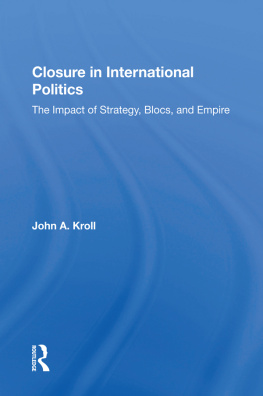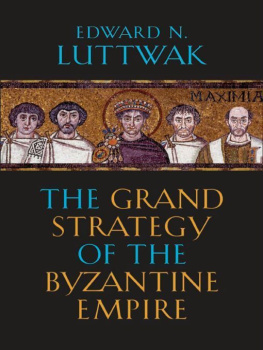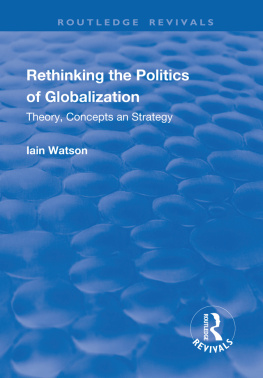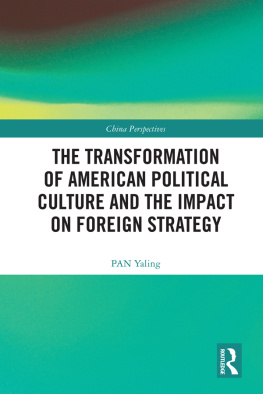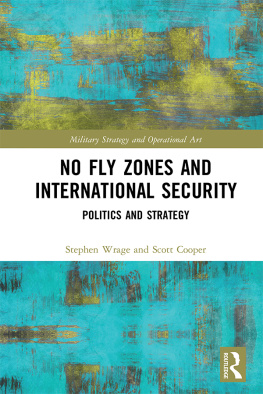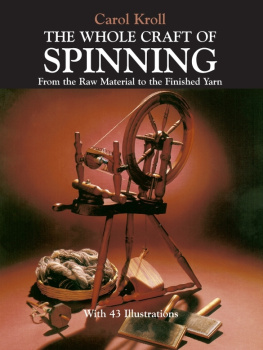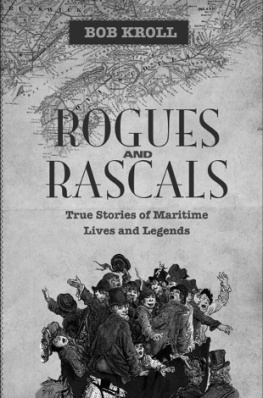Closure in International Politics
The Political Economy of Global Interdependence
Thomas D. Willett, Series Editor
Closure in International Politics: The Impact of Strategy, Blocs, and Empire, John A. Kroll
The Political Economy of Global Interdependence
First published in 1995 by Westview Press
Published in 2021 by Routledge
605 Third Avenue, New York, NY 10017
2 Park Square, Milton Park, Abingdon, Oxon OX14 4RN
Routledge is an imprint of the Taylor & Francis Group, an informa business
Copyright 1995 by Taylor & Francis
All rights reserved. No part of this book may be reprinted or reproduced or utilised in any form or by any electronic, mechanical, or other means, now known or hereafter invented, including photocopying and recording, or in any information storage or retrieval system, without permission in writing from the publishers.
Notice:
Product or corporate names may be trademarks or registered trademarks, and are used only for identification and explanation without intent to infringe.
A CIP catalog record for this book is available from the Library of Congress.
ISBN 0-8133-8938-0
ISBN 13: 978-0-3670-1752-1 (hbk)
ISBN 13: 978-0-3671-6739-4 (pbk)
For my mother and late father
Contents
1 Introduction
Layout of the Book
Conclusions
2 Trade in an Anarchical World
The Debate over Policy
Policies and Outcomes
Structures and Outcomes
Benchmarks
Provenance
3 Defining the National Interest
Analyzing the Politics of Trade
Assumptions
Closure as a Strategic Outcome
Colonization as a Strategic Outcome
Cooperating Within a Prisoners Dilemma
Process
Trade and Cooperation
Conclusions
4 Implications and Hypotheses
From Variables to Policies
Hypothesis
Crossroads
Conclusions
PART TWO CLOSURE IN THE NINETEENTH CENTURY
5 The Rise and Fall of Free Trade
Levels of Trade
Tariffs
Colonies
Alternative Explanations
Conclusions
6 Great Britain and the Collapse of Free Trade
The Success of British Reactions in the Late-Nineteenth Century
The Failure of British Actions in the Late-Nineteenth Century
Conclusions
7 Germany and the Collapse of Free Trade
The Success of German Reactions in the Late-Nineteenth Century
The Failure of German Actions in the Late-Nineteenth Century
Conclusions
PART THREE AVENUES OF COOPERATION
8 Tales of Brave Ulysses
The Collapse of Free Trade in the Late-Nineteenth Century
The GATT and Its Critics
Conclusions
- 1 Introduction
- Layout of the Book
- Conclusions
- 2 Trade in an Anarchical World
- The Debate over Policy
- Policies and Outcomes
- Structures and Outcomes
- Benchmarks
- Provenance
- 3 Defining the National Interest
- Analyzing the Politics of Trade
- Assumptions
- Closure as a Strategic Outcome
- Colonization as a Strategic Outcome
- Cooperating Within a Prisoners Dilemma
- Process
- Trade and Cooperation
- Conclusions
- 4 Implications and Hypotheses
- From Variables to Policies
- Hypothesis
- Crossroads
- Conclusions
- Part Two Closure in the Nineteenth Century
- 5 The Rise and Fall of Free Trade
- Levels of Trade
- Tariffs
- Colonies
- Alternative Explanations
- Conclusions
- 6 Great Britain and the Collapse of Free Trade
- The Success of British Reactions in the Late-Nineteenth Century
- The Failure of British Actions in the Late-Nineteenth Century
- Conclusions
- 7 Germany and the Collapse of Free Trade
- The Success of German Reactions in the Late-Nineteenth Century
- The Failure of German Actions in the Late-Nineteenth Century
- Conclusions
- Part Three Avenues of Cooperation
- 8 Tales of Brave Ulysses
- The Collapse of Free Trade in the Late-Nineteenth Century
- The GATT and Its Critics
- Conclusions
Guide
Tables and Figures
Tables
2.1 The Necessary Conditions for Stable Free Trade Systems and the Policies That Fulfill Them
2.2 Rival Links Between Commercial Policies and Systemic Outcomes
3.1 Taylors Outline of the Possibilities for a Supergame Equilibrium
3.2 The Mechanisms Behind Trade Cooperation
4.1 State Policy and the Rewards from Trade
6.1 Treating Policy as an Independent Variable
6.2 Patterns of British Commercial Policies by Decade
7.1 Patterns of German Commercial Policies by Decade
8.1 Percent of GNP Lost Due to Multilateral Trade War in Which All Other Trading Areas Adopt First Step Optimal Tariff
Figures
2.1 Observations and Changes After Exposure to X and X
3.1 Terms of Trade Effects
3.2 Identifying Paths of Influence for Tariffs
3.3 National Income as a Function of Tariff Rates
3.4 Prisoners Dilemma of Trade for Large States
3.5 Continuous Strategies and Continuous Payoffs
3.6 Trade and Indifference Curves
4.1 Generalizing Tariff Reductions by Large States
5.1 Growth Rates in World Trade Versus Growth Rates in Total Industrial Production (Annual Average in Percent)
5.2 Austro-Hungarian Tariff Revenues as Percent of Total Imports
5.3 French Tariff Revenues as Percent of Total Imports
5.4 German Tariff Revenues as Percent of Total Imports
5.5 British Tariff Revenues as Percent of Total Imports
5.6 Italian Tariff Revenues as Percent of Total Imports
5.7 Russian Tariff Revenues as Percent of Total Imports
5.8 United States Tariff Revenues as Percent of Total Imports
5.9 British Colonies: Area and Population by Year
5.10 French Colonies: Area and Population by Year
5.11 German Colonies: Area and Population by Year
6.1 British Exports to Colonies as a Fraction of Total Exports
6.2 Terms of Trade for Three Economies
Acknowledgments
The major focus of this research is cooperation, the cooperation needed to make free trade a stable outcome in international politics. Such cooperation is much more possible than most realists have argued, but it is far less automatic than many liberals have maintained. Nations can overcome the politically debilitating effects of the anarchic international system, but only when they support free trade with a set of specific, and non-intuitive, commercial policies. It is the waxing and waning of these policies that explains the historical rise and fall of free trade systems.
Similarly, this appearance of this research in book form has been possible only because many individuals and institutions were willing, each in their own way, to support it. It was only through their contributions that I was able to acquire the intellectual, monetary, and personal resources necessary for completing an undertaking of this scope.
My largest thanks go to my mother and my late father. Both toiled tirelessly to ensure that I received the education circumstances had denied them. Without their sacrifices, none of this would have been possible. The support of my brothers, my sister, and their families has also been crucial, both in their encouragement of my studies and in their willingness to assume many familial responsibilities that should have rightly fallen upon me. Three other families bear special mention. The Tompkins and Cermak families welcomed me into their ranks, providing friendship, confidence, and support. The Bridgham family was always there when I needed refuge from a sometimes inhospitable world.

